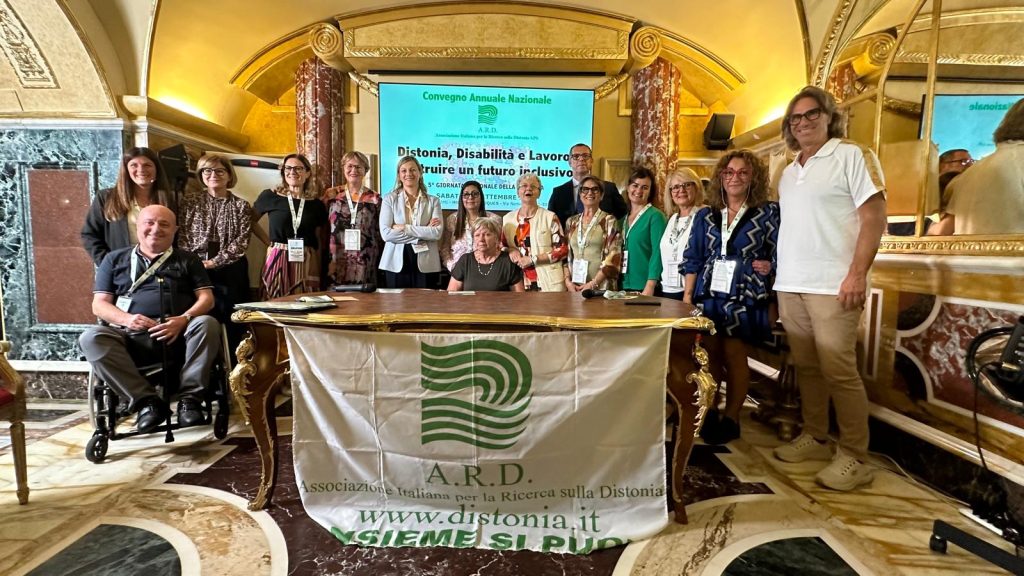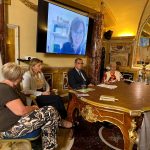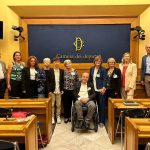On September 28th Associazione per la Ricerca sulla Distonia ( A.R.D.) celebrated the 5th National Dystonia Day with a convention in Rome. The previous 4 Dystonia Days were online events, this year we decided to meet again in person but the whole Day was broadcast live on our social media for all those who could not be in Rome.
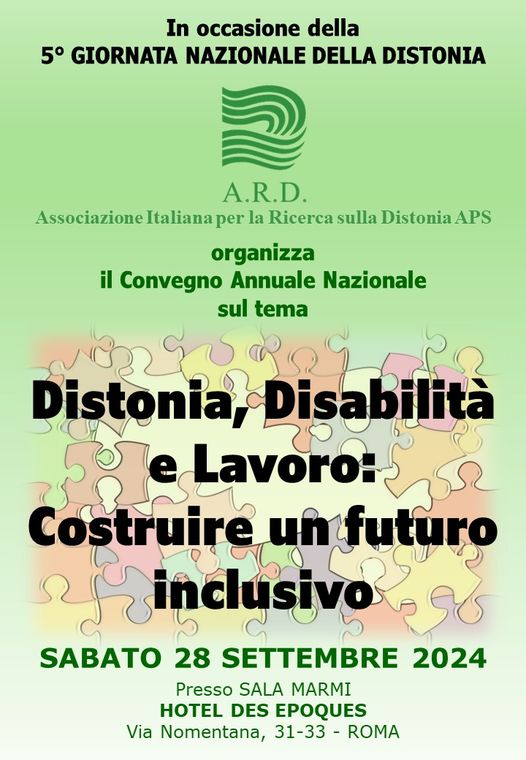
The title of our meeting was “Dystonia, disability and work: building an inclusive future” as we focused on the legislation about benefits for disabled people, in order to avoid discrimination for workers and caregivers. In our previous Dystonia Days we had always dealt with medical topics concerning dystonia, but the disease creates problems at work too and we receive many requests concerning assistance on this matter. We have taken a cue from a recent Italian law issued in May 2024 which modifies some rules about benefits for disabled people .
Our speakers were : Luciano Ciocchetti (Vice President of the Social Affairs Commission in the Chamber of Deputies of our Parliament) ; a labour law lawyer, a citizen advice bureau consultant and a legal consultant.
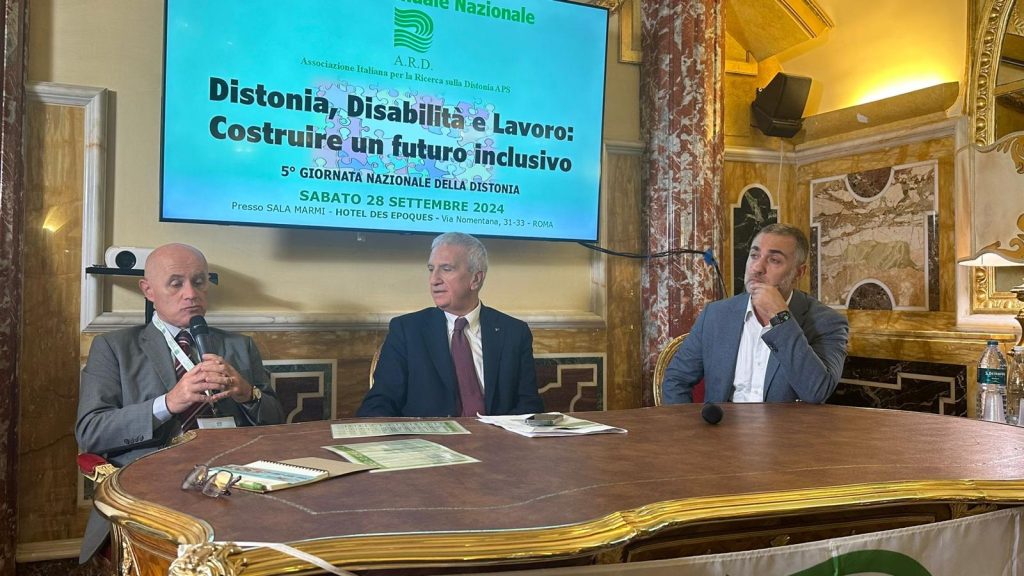
Luciano Ciocchetti
The labour law lawyer and the citizen advice bureau consultant illustrated the procedure: Persons with medical problems may request social benefits simply by addressing their own GP, who sends the patients’ medical story to our National Social Insurance Agency ; an inspection commissioner visits the patients verifying their conditions and attributing a level of disability.
On the basis of their disability, patients and caregivers are entitled to various benefits such as:
-tax relief and tax deductions for medical treatments, social benefits, technical and informatic devices, removal of architectural barriers etc.;
– economic allowance for disabled children;
-3 free working days a month , special leave, part time job , remote home working and early retirement for workers;
– economic allowance for civil disability, according to reduction of working ability
and income .
The current bureaucratic process to achieve these benefits is not easy for dystonic people, as in many cases dystonia is not acknowledged by the inspection commission : usually no neurologist is part of the assessment . The new legislation will overcome this obstacle by allowing one to be assisted by one’s own neurologist.
Luciano Ciocchetti focused on some key issues of the new legislation: the new definition of disabled person based on the International Classification of Functioning, Disability and Health ( ICF) of the World Health Organisation ; a multidimensional assessment of patients’ difficulties; a new electronic dossier which will report all the data about the patient and, as already mentioned, the assistance of one’s own referring doctor during the visit ascertaining the disability; for rare diseases such as dystonia this is an important turning point to pave the way towards an easier access to law benefits.
After this long session concerning legislation rules, our member Francesca told us her story of discrimination at work due to her disphonia which began 18 years ago: she remained totally voiceless for 6 months , later she could speak but not fluently. At first she could remain employed in her firm which accepted her protected status for handicap, later she was considered no longer suitable and was fired. She regrets that people are labelled from their sanitary status rather than from their professional skills and reaffirms the right to live without social prejudices.
The following session concerned caregivers, people who take care of young or adult patients; often their daily demanding job is not adequately considered , often at work they are not allowed to receive the benefits they are entitled to. The President of the Italian Federation of Rare Diseases spoke about protections and opportunities for caregivers, who are estimated to be some million persons in Italy, mainly women. She herself is her son’s caregiver.
Our member Eleonora went to our meeting pushing her husand’s wheelchair: she is his caregiver ; 21 years ago an autoimmune disease caused him a spastic tetraparesis, followed by a multifocal dystonia; their children were 9 and 3 years old, and Eleonora had to help her husband in everything; she tried to continue to work asking for a reduction of her job too, but at last some years ago she was fired. In her long experience her basic points to face situations have been organisation, resilience, equilibrium and empathy.
After a light lunch our meeting continued concerning musician dystonia. Luigi ( a pianist with right hand dystonia) told us about his rehabilitation process still in progress in University La Sapienza in Rome and proposed a video where he is playing a charming piano piece created by himself; he can still continue his career as a musician.
On the other hand, the story of Maurizio showed us that dystonia put an end to his career as trombonist in Santa Cecilia Orchestra in Rome :he could no longer play due to a mouth dystonia and eventually he was fired. 2 years ago Maurizio began the long bureaucratic procedures to get recognition of his dystonia as a work related illness, in order to get the State benefits related to occupational diseases. The legal consultant who helped him informed us that at last Maurizio got the recognition , therefore in Italy he is the first musician whose dystonia has been acknowledged as an occupational disease (in Germany this rule has existed since 2017). This certification could open the way to similar procedures for dystonia caused by other types of work.
At 4 pm our meeting ended, after 5 intense hours of information, personal stories and discussion; we received very good feedback, the event registered a very large number of views in our social media and we have received many requests concerning the bureaucratic rules, which have been clearly explained, pointing patients to the right procedures.
3 days before our Convention we had the opportunity to hold a press conference in the building of our Parliament, in the press room of the Chamber of Deputies. We spoke about the disease, the story and the mission of A.R.D in spreading awareness ; Walter Rizzetto, Deputy of our Parliament, took part in the press conference guaranteeing his support for our next actions.
The poster of our meeting shows a puzzle under the title “Dystonia, disability and work: building an inclusive future “ as we are aware that building an inclusive future is a puzzle; its pieces are in the hands of State institutions, sanitary institutions, doctors, patients and A.R.D. : only if everyone puts its piece in the right way the puzzle will be completed and a better future for people with dystonia will be possible.
Maria Carla Tarocchi, A.R.D. Italy
